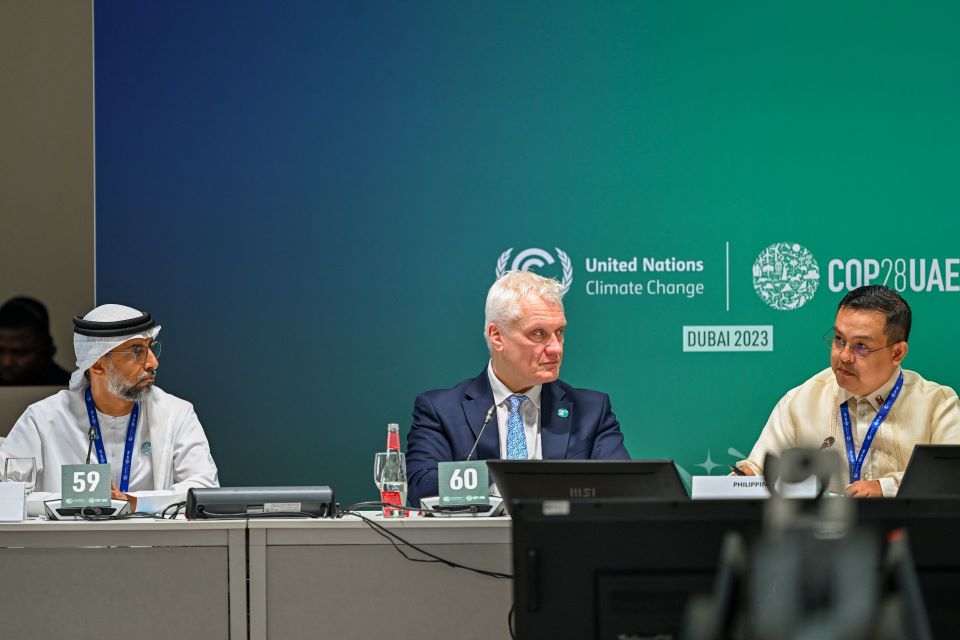Energy Transition Council: Uniting leaders, catalysing finance, empowering clean energy - 8th Ministerial chair’s summary
Published 6 December 2023
Twenty Energy Transition Council (ETC) partners – ministers, international organisations and multilateral development banks – joined the UK, the Philippines, and the UAE at the eighth convening of the ETC on 5 December 2023 at the COP28 in Dubai. The ETC Ministerial focused on ‘Uniting Leaders, Catalysing Finance, Empowering Clean Energy’ and explored routes to mobilising the public and private finance needed to reach the Global Renewable and Energy Efficiency Pledge of tripling renewable energy and doubling energy efficiency by 2030. The ETC is one of the leading institutions responding to the UK’s Power Breakthrough Agenda which was named as a supporting mechanism in the Pledge.
To deliver a just and orderly energy transition while advancing socio-economic development and ensuring energy affordability, reliability and sustainability, we must rapidly accelerate our efforts to ramp up renewable energy deployment. Now is the time to turbocharge solutions and meet the urgency of the moment with ambitious and determined action.

From left to right: Minister Al Mazrouei (UAE), Minister Stuart (UK), Undersecretary Fuentebella (Philippines) chairing the 8th Energy Transition Council Ministerial at COP28.
UK Minister of State for Energy Security and Net Zero, Graham Stuart, re-iterated the UK’s commitment to supporting the ETC partner countries to deliver on their commitments to accelerate the clean energy transition.
Minister Stuart said:
At the heart of the transition is a move away from fossil fuels to renewables. The IEA’s Net Zero Roadmap shows that greater ambition and implementation, supported by stronger international cooperation, is needed to reach our climate goals. That is why the Council continues to pursue efforts to mobilise, coordinate and implement solutions with its 40-strong members.
Through continued collaboration, the Council and its partners support ETC partner countries to deliver on their commitments to accelerate the clean energy transition – including tripling renewable energy and doubling energy efficiency by 2030.
Undersecretary Fuentebella said:
It is clear that increasing the prevalence of renewables contributes positively to improving energy security, affordability and access. A just transition for all must be at the heart of the clean energy transition. Recognising that clean energy would provide substantial benefits – revitalised industry, new jobs, economic growth – it is imperative that we minimize the impacts of climate change on people and planet. This is enabled and enhanced through international collaboration within all sections of society.
Minister Al Mazrouei said:
The importance of financial support in advancing clean energy is immense. Mobilising both public and private finance is vital for this transformation, especially in supporting our partner countries in their clean energy transitions.
It is essential that we work together to ensure that clean power becomes the most affordable, accessible, and attractive option for all countries to meet their power needs efficiently by 2030. The Energy Transition Council is leading this change. Its goals – increasing funding, technical support, and capacity building – are crucial for our ambitious 2030 targets.
Leaders from ETC partner countries, including Morocco, Indonesia, Egypt and Nigeria, set out their commitments to accelerate the clean energy transition. They shared their experiences on key challenges in decarbonising the power sector, and explored opportunities to mobilise additional support, including through the Council’s Rapid Response Facility. ETC partners’ insights provided essential lessons for countries navigating the energy transition. They emphasised the pressing need for increased ambition and collective action, particularly in renewable energy and energy efficiency.
ETC members – governments, institutions and multilateral development banks – responded to the call for support, outlining their continued commitment to identify, champion, coordinate and implement tailored solutions to decarbonise and increase ambition within the power sector.
The Council remains committed to making clean power the most affordable and reliable option to meet their energy needs efficiently by 2030.
